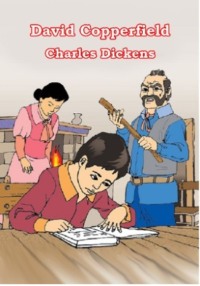
A Tale of Two Cities
In a very few minutes the waiter came in, to announce that Miss Manette had arrived from London, and would be happy to see the gentleman from Tellson’s.
“So soon?”
Miss Manette had taken some refreshment on the road, and required none then, and was extremely anxious to see the gentleman from Tellson’s immediately, if it suited his pleasure and convenience.
The gentleman from Tellson’s had nothing left for it but to empty his glass with an air of stolid desperation, settle his odd little flaxen wig at the ears, and follow the waiter to Miss Manette’s apartment. It was a large, dark room furnished in a funereal manner with black horsehair, and loaded with heavy dark tables. These had been oiled and oiled, until the two tall candles on the table in the middle of the room were gloomily reflected on every leaf; as if they were buried, in deep graves of black mahogany, and no light to speak of could be expected from them until they were dug out.
The obscurity was so difficult to penetrate that Mr. Lorry, picking his way over the well-worn Turkey carpet, supposed Miss Manette to be, for the moment, in some adjacent room, until, having got past the two tall candles, he saw standing to receive him by the table between them and the fire, a young lady of not more than seventeen, in a riding-cloak, and still holding her straw travelling-hat by its ribbon, in her hand. As his eyes rested on a short, slight, pretty figure, a quantity of golden hair, a pair of blue eyes that met his own with an inquiring look, and a forehead with a singular capacity (remembering how young and smooth it was) of lifting and knitting itself into an expression that was not quite one of perplexity, or wonder, or alarm, or merely of a bright, fixed attention, though it included all the four expressions-as his eyes rested on these things, a sudden vivid likeness passed before him, of a child whom he had held in his arms on the passage across that very Channel, one cold time, when the hail drifted heavily and the sea ran high. The likeness passed away, say, like a breath along the surface of the gaunt pier-glass behind her, on the frame of which, a hospital procession of negro Cupids, several headless and all cripples, were offering black baskets of Dead Sea Fruit to black divinities of the feminine gender-and he made his formal bow to Miss Manette.
“Pray take a seat, sir.” In a very clear and pleasant young voice; a little foreign in its accent, but a very little indeed.
“I kiss your hand, miss,” said Mr. Lorry, with the manners of an earlier date, as he made his formal bow again, and took his seat.
“I received a letter from the bank, sir, yesterday, informing me that some new intelligence—or discovery—”
“The word is not material, miss; either word will do.”
“Respecting the small property of my poor father whom I never saw—so long dead—”
Mr. Lorry moved in his chair, and cast a troubled look towards the hospital procession of negro Cupids. As if they had any help for anybody in their absurd baskets!
“Rendered it necessary that I should go to Paris, there to communicate with a gentleman of the bank, so good as to be despatched to Paris for the purpose.”
“Myself.”
“As I was prepared to hear, sir.”
She curtsied to him (young ladies made curtsies in those days), with a pretty desire to convey to him that she felt how much older and wiser he was than she. He made her another bow.
“I replied to the bank, sir, that as it was considered necessary, by those who know, and who are so kind as to advise me, that I should go to France, and that as I am an orphan and have no friend who could go with me, I should esteem it highly if I might be permitted to place myself, during the journey, under that worthy gentleman’s protection. The gentleman had left London, but I think a messenger was sent after him to beg the favour of his waiting for me here.”
“I was happy,” said Mr. Lorry, “to be entrusted with the charge. I shall be more happy to execute it.”
“Sir, I thank you indeed. I thank you very gratefully. It was told me by the bank that the gentleman would explain to me the details of the business, and that I must prepare myself to find them of a surprising nature. I have done my best to prepare myself, and I naturally have a strong and eager interest to know what they are.”
“Naturally,” said Mr. Lorry. “Yes—I—”
After a pause, he added, again settling the crisp flaxen wig at the ears—
“It is very difficult to begin.”
He did not begin, but, in his indecision, met her glance. The young forehead lifted itself into that singular expression—but it was pretty and characteristic, besides being singular—and she raised her hand, as if with an involuntary action she caught at, or stayed, some passing shadow.
“Are you quite a stranger to me, sir?”
“Am I not?” Mr. Lorry opened his hands, and extended them outward with an argumentative smile.
Between the eyebrows and just over the little feminine nose, the line of which was as delicate and fine as it was possible to be, the expression deepened itself as she took her seat thoughtfully in the chair by which she had hitherto remained standing. He watched her as she mused, and the moment she raised her eyes again, went on—
“In your adopted country, I presume, I cannot do better than address you as a young English lady, Miss Manette?”
“If you please, sir.”
“Miss Manette, I am a man of business. I have a business charge to acquit myself of. In your reception of it, don’t heed me any more than if I was a speaking machine—truly, I am not much else. I will, with your leave, relate to you, miss, the story of one of our customers.”
“Story!”
He seemed wilfully to mistake the word she had repeated, when he added, in a hurry, “Yes, customers; in the banking business we usually call our connection our customers. He was a French gentleman, a scientific gentleman, a man of great acquirements—a doctor.”
“Not of Beauvais?”
“Why, yes, of Beauvais. Like Monsieur Manette, your father, the gentleman was of Beauvais. Like Monsieur Manette, your father, the gentleman was of repute in Paris. I had the honour of knowing him there. Our relations were business relations, but confidential. I was at that time in our French house, and had been—oh! twenty years.”
“At that time—I may ask, at what time, sir?”
“I speak, miss, of twenty years ago. He married—an English lady—and I was one of the trustees. His affairs, like the affairs of many other French gentlemen and French families, were entirely in Tellson’s hands. In a similar way, I am, or I have been, trustee of one kind or other for scores of our customers. These are mere business relations, miss; there is no friendship in them, no particular interest, nothing like sentiment. I have passed from one to another, in the course of my business life, just as I pass from one of our customers to another in the course of my business day; in short, I have no feelings; I am a mere machine. To go on—”
“But this is my father’s story, sir; and I begin to think”-that curiously roughened forehead was very intent upon him—“that when I was left an orphan, through my mother’s surviving my father only two years, it was you who brought me to England. I am almost sure it was you.”
Mr. Lorry took the hesitating little hand that confidingly advanced to take his, and he put it with some ceremony to his lips. He then conducted the young lady straightway to her chair again, and holding the chair back with his left hand, and using his right by turns to rub his chin, pull his wig at the ears, or point what he said, stood looking down into her face while she sat looking up into his.
“Miss Manette, it was I. And you will see how truly I spoke of myself just now, in saying I had no feelings, and that all the relations I hold with my fellow-creatures are mere business relations, when you reflect that I have never seen you since. No; you have been the ward of Tellson’s house since, and I have been busy with the other business of Tellson’s house since. Feelings! I have no time for them, no chance of them. I pass my whole life, miss, in turning an immense pecuniary mangle.”
After this odd description of his daily routine of employment, Mr. Lorry flattened his flaxen wig upon his head with both hands (which was most unnecessary, for nothing could be flatter than its shining surface was before), and resumed his former attitude.
“So far, miss (as you have remarked), this is the story of your regretted father. Now comes the difference. If your father had not died when he did—Don’t be frightened! How you start!”
She did, indeed, start. And she caught his wrist with both her hands.
“Pray,” said Mr. Lorry, in a soothing tone, bringing his left hand from the back of the chair to lay it on the supplicatory fingers that clasped him in so violent a tremble—“pray control your agitation—a matter of business. As I was saying—”
Her look so discomposed him that he stopped, wandered, and began anew—
“As I was saying, if Monsieur Manette had not died; if he had suddenly and silently disappeared; if he had been spirited away; if it had not been difficult to guess to what dreadful place, though no art could trace him; if he had an enemy in some compatriot who could exercise a privilege that I in my own time have known the boldest people afraid to speak of in a whisper, across the water, there-for instance, the privilege of filling up blank forms for the consignment of any one to the oblivion of a prison for any length of time; if his wife had implored the king, the queen, the court, the clergy, for any tidings of him, and all quite in vain; then the history of your father would have been the history of this unfortunate gentleman, the doctor of Beauvais.”
“I entreat you to tell me more, sir.”
“I will. I am going to. You can bear it?”
“I can bear anything but the uncertainty you leave me in at this moment.”
“You speak collectedly, and you-are collected. That’s good!” (Though his manner was less satisfied than his words.) “A matter of business. Regard it as a matter of business-business that must be done. Now, if this doctor’s wife, though a lady of great courage and spirit, had suffered so intensely from this cause before her little child was born—”
“The little child was a daughter, sir.”
“A daughter. A-a-matter of business-don’t be distressed. Miss, if the poor lady had suffered so intensely before her little child was born, that she came to the determination of sparing the poor child the inheritance of any part of the agony she had known the pains of, by rearing her in the belief that her father was dead—No, don’t kneel! In Heaven’s name why should you kneel to me!”
“For the truth. O dear, good, compassionate sir, for the truth!”
“A—matter of business. You confuse me, and how can I transact business if I am confused? Let us be clear-headed. If you could kindly mention now, for instance, what nine times ninepence are, or how many shillings in twenty guineas, it would be so encouraging. I should be so much more at my ease about your state of mind.”
Without directly answering to this appeal, she sat so still when he had very gently raised her, and the hands that had not ceased to clasp his wrists were so much more steady than they had been, that she communicated some reassurance to Mr. Jarvis Lorry.
“That’s right, that’s right. Courage! Business! You have business before you; useful business. Miss Manette, your mother took this course with you. And when she died—I believe broken-hearted-having never slackened her unavailing search for your father, she left you, at two years old, to grow to be blooming, beautiful, and happy, without the dark cloud upon you of living in uncertainty whether your father soon wore his heart out in prison, or wasted there through many lingering years.”
As he said the words, he looked down, with an admiring pity, on the flowing golden hair; as if he pictured to himself that it might have been already tinged with gray.
“You know that your parents had no great possession, and that what they had was secured to your mother and to you. There has been no new discovery, of money, or of any other property; but—”
He felt his wrist held closer, and he stopped. The expression in the forehead, which had so particularly attracted his notice, and which was now immovable, had deepened into one of pain and horror.
“But he has been—been found. He is alive. Greatly changed, it is too probable; almost a wreck, it is possible; though we will hope the best. Still, alive. Your father has been taken to the house of an old servant in Paris, and we are going there: I, to identify him if I can: you, to restore him to life, love, duty, rest, comfort.”
A shiver ran through her frame, and from it through his. She said, in a low, distinct, awe-stricken voice, as if she were saying it in a dream—
“I am going to see his ghost! It will be his ghost—not him!”
Mr. Lorry quietly chafed the hands that held his arm.
“There, there, there! See now, see now! The best and the worst are known to you. You are well on your way to the poor wronged gentleman, and, with a fair sea voyage, and a fair land journey, you will be soon at his dear side.”
She repeated, in the same tone, sunk to a whisper, “I have been free, I have been happy, yet his ghost has never haunted me!”
“Only one thing more,” said Mr. Lorry, laying stress upon it as a wholesome means of enforcing her attention: “he has been found under another name; his own, long forgotten or long concealed. It would be worse than useless now to inquire which; worse than useless to seek to know whether he has been for years overlooked, or always designedly held prisoner. It would be worse than useless now to make any inquiries, because it would be dangerous. Better not to mention the subject, anywhere or in any way, and to remove him—for a while at all events—out of France. Even I, safe as an Englishman, and even Tellson’s, important as they are to French credit, avoid all naming of the matter. I carry about me, not a scrap of writing openly referring to it. This is a secret service altogether. My credentials, entries, and memoranda, are all comprehended in the one line, ‘Recalled to life’; which may mean anything. But what is the matter! She doesn’t notice a word! Miss Manette!”
Perfectly still and silent, and not even fallen back in her chair, she sat under his hand, utterly insensible; with her eyes open and fixed upon him, and with that last expression looking as if it were carved or branded into her forehead. So close was her hold upon his arm, that he feared to detach himself lest he should hurt her; therefore he called out loudly for assistance without moving.
A wild-looking woman, whom even in his agitation Mr. Lorry observed to be all of a red colour, and to have red hair, and to be dressed in some extraordinary tight-fitting fashion, and to have on her head a most wonderful bonnet like a grenadier wooden measure, and good measure too, or a great Stilton cheese, came running into the room in advance of the inn servants, and soon settled the question of his detachment from the poor young lady, by laying a brawny hand upon his chest, and sending him flying back against the nearest wall.
(“I really think this must be a man!” was Mr. Lorry’s breathless reflection, simultaneously with his coming against the wall.)
“Why, look at you all!” bawled this figure, addressing the inn servants. “Why don’t you go and fetch things, instead of standing there staring at me? I am not so much to look at, am I? Why don’t you go and fetch things? I’ll let you know, if you don’t bring smelling-salts, cold water, and vinegar, quick, I will!”
There was an immediate dispersal for these restoratives, and she softly laid the patient on a sofa, and tended her with great skill and gentleness; calling her “my precious!” and “my bird!” and spreading her golden hair aside over her shoulders with great pride and care.
“And you in brown!” she said, indignantly turning on Mr. Lorry; “couldn’t you tell her what you had to tell her, without frightening her to death? Look at her, with that pretty pale face and her cold hands. Do you call that being a banker?”
Mr. Lorry was so exceedingly disconcerted by a question so hard to answer, that he could only look on, at a distance, with much feebler sympathy and humility, while the strong woman, having banished the inn servants under the mysterious penalty of “letting them know” something not mentioned if they stayed there, staring, recovered her charge by a regular series of gradations, and coaxed her to lay her drooping head upon her shoulder.
“I hope she will do well now,” said Mr. Lorry.
“No thanks to you in brown, if she does. My darling pretty!”
“I hope,” said Mr. Lorry, after another pause of feeble sympathy and humility, “that you accompany Miss Manette to France?”
“A likely thing, too!” replied the strong woman. “If it was ever intended that I should go across salt water, do you suppose Providence would have cast my lot in an island?”
This being another question hard to answer, Mr. Jarvis Lorry withdrew to consider it.
Конец ознакомительного фрагмента.
Текст предоставлен ООО «ЛитРес».
Прочитайте эту книгу целиком, купив полную легальную версию на ЛитРес.
Безопасно оплатить книгу можно банковской картой Visa, MasterCard, Maestro, со счета мобильного телефона, с платежного терминала, в салоне МТС или Связной, через PayPal, WebMoney, Яндекс.Деньги, QIWI Кошелек, бонусными картами или другим удобным Вам способом.








